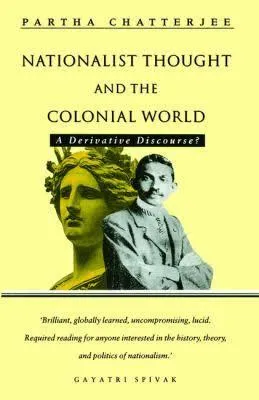Nationalist Thought and the Colonial World: A Derivative Discourse

Navigating Colonial Legacies: A Journey through "Nationalist Thought and the Colonial World" by Partha Chatterjee
Introduction: Unveiling Colonial Narratives with Partha Chatterjee
In "Nationalist Thought and the Colonial World: A Derivative Discourse" by Partha Chatterjee, readers are invited to embark on a scholarly exploration of nationalist ideologies in the colonial context. Chatterjee's work takes us beyond conventional narratives, unraveling the complexities of nationalist thought and its intricate relationship with the colonial world.
The Roots of Nationalist Thought: A Complex Tapestry
Diverse Strands of Nationalism
Chatterjee delves into the diverse strands of nationalist thought that emerged in response to colonial rule. The book becomes a map, guiding readers through the intricate tapestry of ideas that shaped the resistance against imperialism. It's not merely an academic discourse; it's a journey into the intellectual ferment of the colonial era.
Personal Anecdote: Unearthing Family Narratives
Engaging with Chatterjee's exploration brought to mind conversations with my own family about our colonial past. It became a bridge connecting academic discourse with personal narratives, prompting me to consider how the echoes of nationalist thought reverberated through the stories of my ancestors. The book, in this context, became a catalyst for a deeper understanding of my own heritage.
The Derivative Discourse: Negotiating with Colonialism
Chatterjee's Concept of Derivative Discourse
Chatterjee introduces the concept of a derivative discourse, where nationalist thought negotiates with colonial discourses rather than outright rejecting them. The book becomes a lens through which we examine how colonial ideas were absorbed, transformed, and repurposed in the process of constructing nationalist ideologies.
Personal Reflection: Negotiating Cultural Identity
Reflecting on the derivative discourse prompted personal contemplation about how cultures negotiate their identities in the face of external influences. It became a thought-provoking exercise in understanding the fluidity of cultural boundaries and the ways in which our identities are shaped by complex interactions. The book, in this regard, became a source of intellectual stimulation for navigating the intricacies of cultural identity.
The Role of Language: Power and Resistance
Language as a Tool of Resistance
Chatterjee emphasizes the role of language in the construction of nationalist thought. The book becomes a study of how language served as a powerful tool of resistance, enabling the articulation of anti-colonial sentiments and the formulation of alternative visions for the future.
Personal Connection: Language as Cultural Heritage
Contemplating the role of language resonated with my own experiences of reconnecting with ancestral languages. It became a reminder that language is not just a medium of communication; it's a repository of cultural heritage and resistance. The book encouraged me to delve deeper into the linguistic dimensions of identity.
Legacies of Nationalist Thought: Post-Colonial Realities
Chatterjee's Exploration of Post-Colonial Realities
Chatterjee extends the discussion beyond the colonial era, examining how nationalist thought shaped post-colonial realities. The book becomes a mirror reflecting the enduring impact of these ideas on the political, cultural, and social landscapes of nations that emerged from colonial rule.
Personal Insight: Navigating Post-Colonial Spaces
Engaging with the exploration of post-colonial realities prompted personal introspection about navigating contemporary spaces shaped by nationalist ideologies. It became an opportunity to critically examine the legacies of the past and consider how they continue to influence our present. The book, in this light, served as a guide for understanding the complex dynamics of post-colonial societies.
Conclusion: A Scholarly Odyssey into Nationalist Thought
"Nationalist Thought and the Colonial World" is more than an academic discourse; it's a scholarly odyssey into the realms of resistance, negotiation, and identity formation. As you journey through Chatterjee's insights, may you not only grasp the nuances of nationalist thought but also reflect on how it intersects with your own understanding of history and identity.
So, whether you are a student of colonial history, a curious reader, or someone grappling with questions of cultural identity, let Chatterjee's work be a companion on your intellectual journey through the landscapes of nationalist thought.